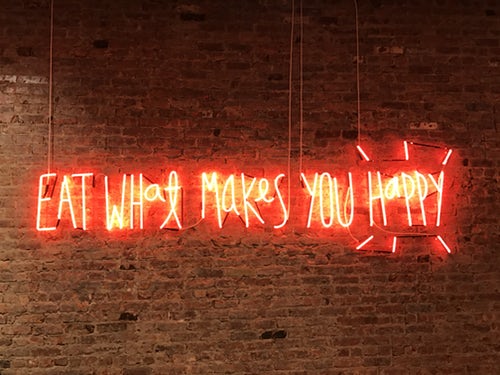You’ve heard it before, I’ve heard it before, we’ve all heard it before.
The incredibly common and yet highly non-useful advice to not listen to or follow bs nutrition and diet info.
Why am I describing what is often well-meaning (and sometimes also really not well meaning) advice as highly non-useful? Well, because it’s ambiguous and intention aside the question of what is nutrition bs and what is legit and how on earth are we supposed to know is completely overlooked…
Seriously, while some of it is obviously quackery for the most part it’s confusing af (to put it lightly) to even attempt to decipher useful from bs and in many cases even when we think we’re getting it right we’re not! I mean everyone and their dog has an opinion on what to eat and what not to eat (and rightly so because hey we all eat).
So, instead of telling you to simply not follow bad nutrition advice and leave it there like it’s completely clear what’s legit and what’s bad I have put together my top 3 everyday nutrition red flags that I come across.
This is with the intention that you can then keep them in the back of your mind to let you quickly identify when that nutrition information is in fact bs and when to go elsewhere because just as there’s some terrible advice out there you can rest assured that there’s also some great advice!
There are plenty more red flags then the following 3 but if you start here, you’ll not only be well ahead of most but also save yourself a lot of time and pain. It’s never too early and it’s never to late to begin to get it right.
Here they are: 3 short red flag sentences that when you hear spoken (or see written) you can confidently know you’re in the wrong place and respectfully step away and continue looking for the person who can help you.
- “Take This Superfood Supplement”

There is absolutely nothing wrong with eating things marketed as “Superfoods” (to find out more about Superfoods click this link to read my earlier post “Superfoods: What You Need to Know”) but if someone is insisting it is going to be a cure all that’s a sign that they really have no clue. Simple.
Anyone trying to get you to eat something because it is a “Superfood” (especially in the form of a pill, powder or other processed concoction) has a very limited understanding of nutrition and human health. If that is, they believe it otherwise they’re just making money off selling it themselves.
Keep moving now or keep moving later it’s up to you. Either way you’re going to have to move because they’re not the person for you. They need to work on themselves before they work on others.
2. “You Need to Go on A Detox”

Anyone insisting you need to go on any form of detox has a fundamental misunderstanding of human physiology.
Your digestive system does not need a break.
Your digestive system very well may need a break from stress, but it does not need a break from food. In fact if we give our digestive systems too long a “rest” the opposite happens – the muscle contractions that move food through your digestive system decreas, your gut microbiota or healthy gut bacteria are disrupted (remember they also survive off what you eat) and even your microvilli can atrophy (breakdown) making digestion all that much harder when you do reintroduce food.
Is there anything wrong with going on a “detox”? Essentially for many people it’s not going to be incredibly harmful, it may even be beneficial if it is the catalyst which brings attention to correcting undesirable food habits in the long term but with regards to the short term effects of the detox itself there’s not much benefit. Then there is the other side of the story that gets skimmed over and that is the fact that for some a detox can be just downright dangerous and as much as this is most likely a low risk it’s still a risk and it doesn’t matter how low the risk if you’re that person the consequences will be massive. I’m talking long term gut problems, eating disorder development and nutritional deficiencies.
If someone is pushing a detox as your cure all please don’t risk, it. Health is not found in the extremes, move on.
- “Cut out X, Y and Z Food Groups, Now”

The recommendation for cutting out multiple food groups especially at the first consult is big fat red flag number 3.
Why? because anyone with an understanding of human nutrition and beyond that a care in the world about you as a unique human being will listen to you, get to know you and your needs before jumping in and telling you what you need to do.
Essentially, you might want to think about it like this – you can’t hit “GO” on a solution until you know the problem, right?
From the point of view of a universally recognised nutrition expert (aka an accredited practicing dietitian) a first consult really is about getting to know that person as an individual before believing that you can offer any form of nutrition intervention that would meet their needs. If a first consult is not going like this and they straight away diagnose you left right and centre yeah you know the drill, move on. Sometimes it’s a process of elimination.
One Overarching Red Flag

I hope you picked up on one overarching theme as you read this (as I hope you do reading any and all of my other blogs) and which 3 red flags can be condensed into and that is that dogma has no place in healthcare.
Why? Because as Dr. Michael Ruscio so poignantly put it “Dogma can only exist in the presence of ignorance”.
The less you know the more certain you are that your view of the world and the way things are is correct. If you don’t believe me and you think passion and confidence are indicative of someone who knows their s*it Google it (it’s called the Dunning-Kruger effect) or click this link to read my earlier blog which summarises this very succinctly “The Issue of Confidence vs Competence in Healthcare”.
Here’s a somewhat counter-intuitive but good rule of thumb if someone is shouting universal nutrition advice from the rooftops, they have no clue.
What makes this confusing for those hearing it is that having no clue does not always mean they are intentionally trying to deceive you nor that they know they have no clue. Which means they’re often uber believable because they’re burrowing so deeply into the little piece of nutrition knowledge they have. However, now you have the power because now you know how to identify when someone really has no clue and that’s all that matters. You don’t have to educate them or fix them you just have to move on.
On the other hand, the more you know the more you are aware and accepting of alternatives.
Any person who is well educated and well experienced with the intricacies and complexities of real life nutrition will readily tell you that the number one factor of good health is getting to know your body and what works for you (not following rules of what “theoretically” works or what worked for them). If someone doesn’t practice from this framework, they aren’t at the level of understanding they need to be for me to be comfortable with putting my health in their hands and neither should you be.
The Bottom Line

Congratulations you now know the 3 common big red flags of nutrition bs! You can now use your depth of knowledge to quickly help you identify whether or not you are partnering with a true nutrition professional or a pseudo nutrition professional are: do they push “Superfoods?” Do they insist you detox? or that you need to cut out multiple food groups at your very first consult with them?
All 3 of these red flags come under the broader problem that this person is showing a complete inability to elicit, respond to and tailor information and advice to your individual needs (aka the whole point of seeing a nutritional professional yes?)
So after all the red flags what’s a simple green flag to help you decide you’re in the right place?
If you choose to see a nutrition professional, you should feel that the focus is always on putting the power back in your hands. No exceptions.
After all you must remember that it is your choice to work with a nutrition professional. You choose to work with a nutrition professional for you. This means they are there to serve you, question them and choose wisely because at the end of the day the outcome is always a change in your life and not theirs!
I wish you well on your quest to change your life for the rest of your life. There is much to learn and there will always be more and that is a part of what makes like magical.
With All My Heart I Hope You Found This Information Useful and Inspiring.

Become Great. Live Great.
Bonnie.



